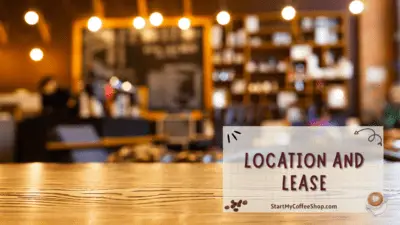Opening a coffee shop is an exciting entrepreneurial venture. From creating a cozy atmosphere to serving aromatic brews, the experience can be incredibly fulfilling. However, before you embark on this journey, it’s important to understand the start-up costs involved.
Start-up costs for coffee shops can vary widely depending on factors such as location, size, and equipment. On average, you can expect to invest anywhere from $80,000 to $300,000 or more.
In this article, I will explore the various expenses associated with opening a coffee shop and provide you with a comprehensive guide to help you plan your budget effectively.
Location and Lease
The first step is to carefully consider various factors that can significantly impact your business. Foot traffic plays a crucial role, as higher footfall means more potential customers passing by your shop. Additionally, evaluating nearby businesses is essential as they can either complement or compete with your coffee shop.

Understanding your target market is vital in selecting the right location. Consider demographics such as age, income level, and lifestyle preferences. For instance, a coffee shop near a university campus might cater to students and faculty members, while a location in a business district could attract professionals seeking a quick caffeine fix.
It’s important to note that rent costs can vary significantly depending on the city and specific location. Collaborating with a real estate agent who specializes in commercial properties can be immensely beneficial. They can provide expert guidance and help negotiate lease terms that align with your budget and long-term business goals.
When evaluating potential locations, also consider the infrastructure and accessibility of the area. Adequate parking facilities, public transportation access, and pedestrian-friendly streets contribute to the convenience and attractiveness of your coffee shop.
Finding the right location is a crucial investment in your coffee shop’s achievement. Take the time to thoroughly research and analyze various factors to ensure you make an informed decision that sets the foundation for a thriving business.
Read more about: Mobile Coffee Cart Business Plan: Hitting the Road with Coffee
Renovations and Interior Design
Crafting an inviting ambiance is vital in creating a coffee shop that customers will love. The costs associated with renovations and interior design will vary based on the condition and size of the chosen space. When budgeting, consider expenses such as painting, flooring, lighting, seating options, countertops, and fixtures.
To ensure a cohesive and visually appealing design, it’s wise to allocate a portion of your budget to professional interior designers. Their expertise in creating functional and aesthetically pleasing layouts can elevate your coffee shop’s atmosphere. They can help with choosing color schemes, furniture arrangements, and incorporating branding elements.
If hiring an interior designer is not feasible, consulting with local contractors can provide valuable insights. They can assess the space, understand your vision, and provide estimates for the costs involved in transforming it into a cozy coffee haven. Remember to discuss your desired ambiance, functionality, and any specific requirements you have in mind.
Creating an ambiance that aligns with your coffee shop’s brand and appeals to your target audience is a worthwhile investment. It sets the stage for memorable experiences and fosters a welcoming environment that keeps customers coming back for more.\
Equipment and Supplies
The efficient operation of a coffee shop necessitates a comprehensive range of equipment and supplies. Essential equipment comprises commercial-grade espresso machines, grinders, coffee brewers, blenders, refrigeration units, display cases, and cash registers or point-of-sale systems. These tools enable you to deliver quality beverages and handle transactions smoothly.
In addition to equipment, stocking up on necessary supplies is crucial. Coffee beans, sourced from reputable suppliers, form the backbone of your coffee offerings. Milk, syrups, and other flavorings contribute to creating a diverse menu. Cups, lids, napkins, and other consumables ensure a seamless customer experience.
When planning your budget, research reputable suppliers to obtain competitive prices for equipment and supplies. Consider whether purchasing or leasing equipment is a better fit for your financial situation. Leasing options can help reduce upfront costs, while purchasing allows for long-term ownership. Factor in the ongoing costs of restocking supplies to maintain a consistent inventory.
Keep in mind that investing in high-quality equipment and sourcing premium ingredients may require a higher upfront cost but can result in improved customer satisfaction and long-term cost savings. Striking a balance between cost-efficiency and quality is key to establishing a sustainable coffee shop.
Licenses and Permits

Compliance with legal requirements is a fundamental aspect of starting a coffee shop. Obtaining the necessary licenses and permits is crucial to ensure a smooth and lawful operation. The costs associated with licenses and permits can include health permits, food service permits, business licenses, zoning permits, and signage permits, among others.
Health permits are typically required to ensure that your coffee shop meets the necessary health and safety standards. Food service permits are essential for establishments that serve food and beverages, ensuring compliance with regulations related to food handling, preparation, and storage.
Obtaining a business license is a fundamental requirement for operating any business. The specific type of license and associated costs may vary based on your location and local regulations. Zoning permits ensure that your coffee shop is appropriately located within the designated zone for commercial activities.
Signage permits are necessary if you plan to display signs or banners to advertise your coffee shop. These permits often have specific guidelines regarding size, placement, and design.
To determine the necessary permits for your specific location and estimate the associated costs, it is advisable to consult with local authorities or seek legal advice from an attorney specializing in business regulations. They can provide guidance and ensure that you meet all legal requirements, helping you avoid potential fines or penalties.
Read more about: Mobile Coffee Business Plan: The Mobile Barista Blueprint
Staffing and Training
Hiring and training a skilled staff is essential in providing exceptional customer service at your coffee shop. Begin by considering the number of employees you’ll require based on your projected volume of business. This will help you determine the appropriate staffing levels to ensure smooth operations and customer satisfaction.
When budgeting, allocate funds for employee wages, benefits, and other compensation packages. Competitive wages attract and retain talented individuals who can contribute to the progress of your coffee shop. Benefits such as health insurance paid time off, and retirement plans can also enhance employee satisfaction and loyalty.
Don’t forget to factor in training costs, as proper training is key to ensuring consistent quality in your products and service. Investing in initial and ongoing training programs will equip your staff with the necessary skills and knowledge to excel in their roles. This includes training on coffee brewing techniques, customer interaction, and other job-specific skills.
Consider allocating funds for staff uniforms as well, as they can contribute to a professional and cohesive brand image. Uniforms not only create a consistent visual identity but also help customers easily identify your staff members.
Lastly, set aside resources for ongoing staff development. The coffee industry is constantly evolving, and it’s important to keep your team up to date with industry trends, new brewing methods, and emerging flavors. This can be achieved through workshops, seminars, or online courses.
Marketing and Promotion
To build brand awareness and attract customers to your coffee shop, implementing effective marketing strategies is essential. Allocate a portion of your budget towards the development of a visually appealing website that showcases your brand, menu, and unique offerings. A well-designed website serves as a virtual storefront and can help customers discover your coffee shop online.
Invest in social media campaigns to engage with your target audience and create a digital presence. Utilize platforms such as Instagram, Facebook, and Twitter to share captivating visuals, engage with followers, and promote special offers or events. Effective social media marketing can generate buzz and attract potential customers.
Local advertising plays a significant role in reaching your immediate community. Consider advertising in local newspapers, magazines, or online directories. Additionally, invest in promotional materials such as business cards, flyers, or brochures that reflect your brand identity and provide information about your coffee shop.
Consider partnering with local influencers who align with your coffee shop’s values and target audience. Collaborations can include sponsored posts, reviews, or giveaways, helping to expand your reach and credibility among your followers.
Organizing events, such as coffee tastings, live music performances, or community gatherings, can create excitement and draw attention to your coffee shop. This provides an opportunity for people to experience your offerings and form a connection with your brand.
Remember to regularly evaluate the effectiveness of your marketing efforts and adjust your strategies accordingly. Building brand awareness takes time, consistency, and creativity. By investing in strategic marketing activities, you can attract customers and establish a strong presence within your local community and beyond.
Utilities and Operating Expenses

Running a coffee shop entails various ongoing expenses that need to be accounted for in your budget. These include utility costs for electricity, water, and gas, as well as internet and phone services to facilitate smooth operations and communication. These essential services keep your coffee shop running efficiently.
Insurance is another critical aspect to consider. Property insurance protects your physical assets, liability insurance safeguards against potential accidents or injuries on your premises, and workers’ compensation insurance covers employees in the event of work-related injuries or illnesses. Investing in comprehensive insurance coverage provides peace of mind and financial protection.
Regular maintenance is crucial for the upkeep of your coffee shop. This includes routine repairs, equipment servicing, and general maintenance tasks to ensure everything operates optimally. Allocating funds for ongoing maintenance helps prevent unexpected breakdowns and keeps your coffee shop in top condition.
By including these operational costs in your budget, you can effectively manage day-to-day expenses and maintain a smooth and efficient operation. Proper financial planning ensures that your coffee shop remains functional and provides a comfortable and enjoyable experience for both your staff and customers.
Read more about: Mobile Coffee Bar Business Plan: On-the-Go Brews
Contingency Fund
Having a contingency fund is essential for the financial stability of your coffee shop. Unforeseen expenses and fluctuations in revenue are common in any business, especially during the early stages of operation. To ensure you can handle unexpected costs and emergencies, it’s wise to set aside a percentage of your budget as a safety net.
A contingency fund acts as a buffer to cover unexpected expenses, such as equipment repairs, unexpected maintenance, or unforeseen legal fees. It provides a financial cushion that allows you to address these challenges without jeopardizing the overall operation of your coffee shop.
Additionally, fluctuations in revenue can occur due to seasonal variations, economic downturns, or unforeseen circumstances. A contingency fund helps bridge the gap during periods of lower revenue, ensuring you can continue to meet your financial obligations and sustain your business until revenue stabilizes.
By allocating a portion of your budget to a contingency fund, you demonstrate prudent financial planning and establish a safety net that protects your coffee shop’s long-term viability. It provides peace of mind, allowing you to navigate unforeseen challenges and maintain stability in the face of uncertainties.
Summary
Opening a coffee shop is an exciting endeavor, but it’s essential to approach it with careful financial planning. A well-thought-out budget will set you on the path to turning your caffeinated dreams into a thriving reality.
Frequently Asked Questions

How do I choose the right location for my coffee shop?
Consider factors such as foot traffic, nearby businesses, demographics, and competition.
What equipment and supplies are essential for a coffee shop?
Essential equipment includes espresso machines, grinders, brewers, refrigeration units, display cases, and cash registers. Supplies include coffee beans, milk, syrups, cups, lids, and other consumables.
What licenses and permits do I need to operate a coffee shop?
Licensing requirements vary by location, but generally, you’ll need health permits, food service permits, business licenses, zoning permits, and signage permits.
To learn more on how to start your own coffee shop, check out my startup documents here.
Disclaimer: The information provided by StartMyCoffeeShop.com (“The Site”) is for general informational purposes only. All information on the Site is provided in good faith. However, we make no representation or warranty of any kind, express or implied, regarding the accuracy, adequacy, validity, reliability, availability, or completeness of any information on the Site. Under no circumstance shall we have any liability to you for any loss or damage of any kind incurred as a result of the use of the Site or Reliance on any information provided on the Site. Your use of the Site and reliance on any information on the Site is solely at your own risk. This blog post is for educational purposes only and does not constitute legal advice. Please consult a legal expert to address your specific needs. Terms and Conditions. (https://startmycoffeeshop.com/terms-and-conditions/)

Hi! I’m Shawn Chun
My adventure in coffee began when I first launched my first coffee shop back in the early 2000s. I had to figure out so many things on my own and to make it worse within 2 years of opening two large corporate coffee chains moved in just blocks away from me!
As I saw smaller and even some larger coffee shops in the neighborhood slowly lose customers to these giant coffee chains and slowly close up shop, I knew that I had to start getting creative…or go out of business.
I (like you may be) knew the coffee industry well. I could make the best latte art around and the foam on my caps was the fluffiest you have ever seen. I even had the best state-of-the-art 2 group digital Nuova Simonelli machine money could buy. But I knew that these things alone would not be enough to lure customers away from the name brand established coffee shops.
Eventually, through lots of trial and error as well as perseverance and creativity I did find a way to not only survive but also thrive in the coffee/espresso industry even while those corporate coffee chains stayed put. During those years I learned to adapt and always faced new challenges. It was not always easy, however, in the end, I was the sole survivor independent coffee shop within a 10-mile radius of my location. Just two corporate coffee chains and I were left after that year. All told the corporate coffee chains took down over 15 small independent coffee shops and kiosks and I was the last one standing and thriving.
Along the years I meet others with the same passion for coffee and I quickly learned that it is not only “how good a barista is” that makes a coffee shop successful, but the business side of coffee as well.
Hence why I started this website you are on now. To provide the tools and resources for up and coming coffee shop owners to gain that vital insight and knowledge on how to start a coffee shop successfully.
Stick around, browse through my helpful blog and resources and enjoy your stay! With lots of LATTE LOVE!
Shawn







